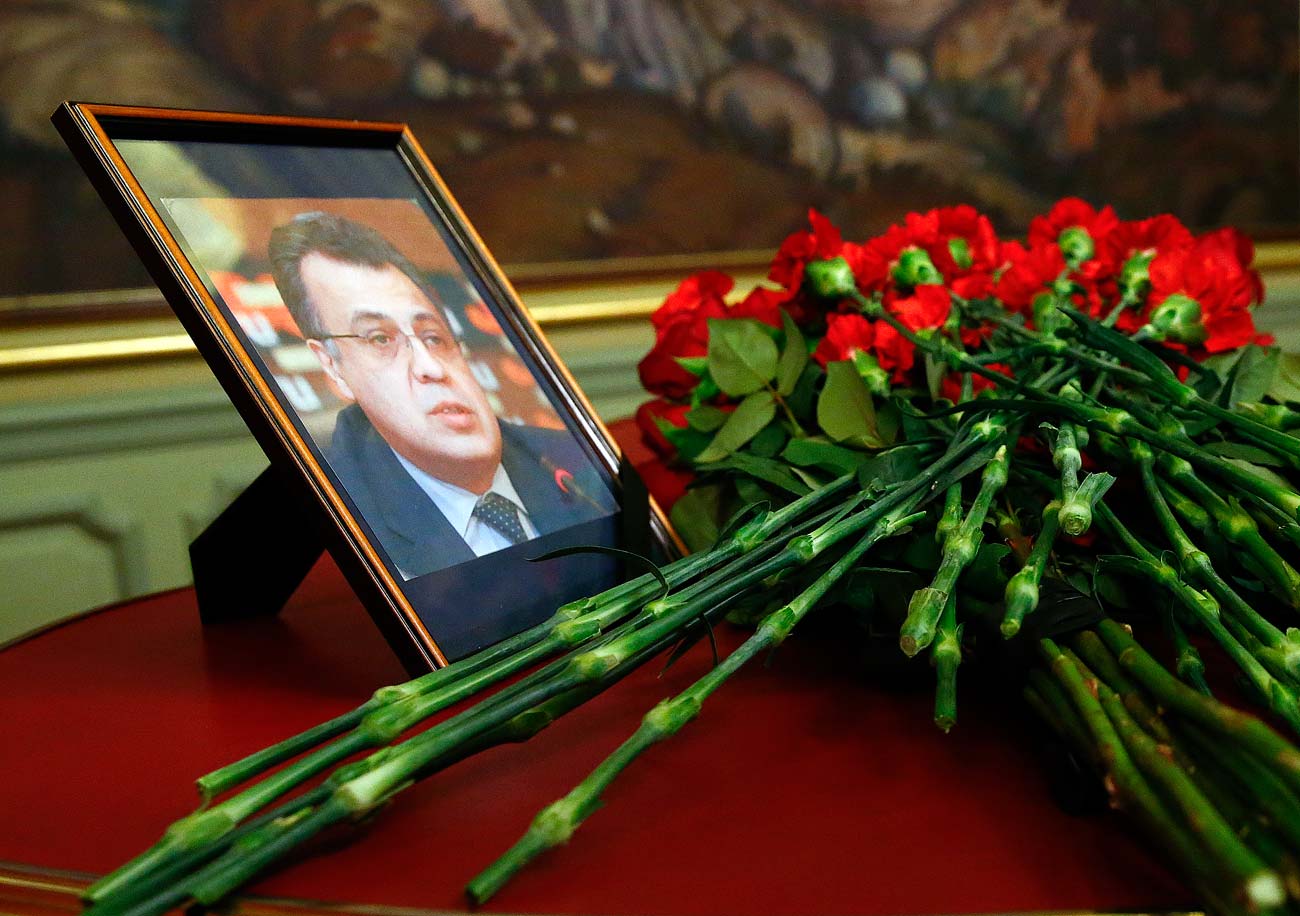
Flowers are placed near a portrait of murdered Russian ambassador to Turkey Andrei Karlov during a meeting of Russian Foreign Minister Sergei Lavrov with his Turkish counterpart Mevlut Cavusoglu in Moscow, Russia
ReutersMevlut Mert Altintas, a former Turkish police officer, shot and killed Russian Ambassador to Turkey Andrei Karlov as the diplomat was speaking at a photo exhibition in Ankara on the evening of December 19. According to Turkish authorities, Altintas was dismissed from the police after the coup attempt in July.
Russia has not experienced a tragedy of this scale for over 90 years. The last assassination of a high-ranking diplomatic official occurred in 1923, when Soviet diplomat Vatslav Vorovsky was assassinated by a White Guard officer in Switzerland.
Shortly after the assassination, Vladimir Putin made an official statement. The Russian president expressed his condolences to the ambassador's family and friends, saying that Karlov "died in the line of duty." Putin was personally acquainted with Karlov, describing him in his remarks as "an excellent diplomat" and "a good, soft person."
The assassination occurred on the eve of the trilateral meeting between the Russian, Turkish and Iranian foreign ministers in Moscow. Putin claimed that the terrorist act is a provocation aimed at undermining the improvement of Russian-Turkish relations. "The response can only be the strengthening of the fight against terror. And the bandits will feel this," the Russian leader promised.
The tragedy had particular significance for the diplomatic community. On the night of the assassination, people began bringing flowers to the Foreign Ministry building on Smolenskaya Square in Moscow. Foreign Minister Sergei Lavrov said that the Russian and Turkish presidents had agreed to a joint investigation of the "brutal murder."
Lavrov believes that the goal of the crime's organizers was mostly to prevent an effective fight against terrorism in Syria. They won't achieve anything, Lavrov is convinced. The minister thanked Russians and his foreign colleagues for their solidarity in this difficult moment.
The Russian Foreign Ministry has created a Facebook "virtual memorial book," in which anyone can express his or her condolences. Russians and foreigners have already begun posting messages. "In this difficult moment for everyone, I wish you strength and tranquility. The whole country is with you in their thoughts. I offer my condolences," writes Anna Mezentseva. "The whole world mourns his death, and hopes that his memory will serve to spur others on to fight for a planet free of political violence," David Lemire from New Zealand added to the virtual book.
Officials have been offering their condolences to Karlov's family and colleagues and condemning the terrorists. Many are also asking how Altintas could so easily get into a building hosting an event attended by foreign ambassadors.
Chairman of the Federation Council Committee on International Affairs Konstantin Kosachev wrote on his Facebook page, "Karlov's assassin was fired from the police after the coup attempt on July 15, but kept his police identification. How is that possible?" In Kosachev's opinion, either his police ID was not revoked, or Altintas did not hand it in. Either theory shows "the terrible disorderliness" of the Turkish police. Until the murder is clarified, writes the politician, Russians should avoid going to Turkey.
A similar viewpoint was expressed by Russian Deputy Foreign Minister Oleg Syromolotov. "I think that any person who intends to travel to Turkey must seriously think before doing so because terrorist acts occur there almost every day."
Turkey was not the only country that was unable to guarantee Andrei Karlov's security, writes Arab scholar and international journalist Marianna Belenkaya in Livejournal. "We were unprepared," states Belenkaya, adding that many people in the Middle East despise Russia for its actions, especially in Syria.
In Belenkaya's opinion, Russia should follow the example of the U.S., which takes "unprecedented" security measures for its diplomats in the Middle East, since they are "prepared for someone coming and blowing them up at any moment." Increased security measures is the price for active politics in the region, notes Belenkaya, and Karlov's assassination is a sign that security needs to be strengthened.
All rights reserved by Rossiyskaya Gazeta.
Subscribe
to our newsletter!
Get the week's best stories straight to your inbox